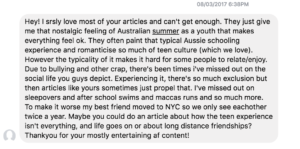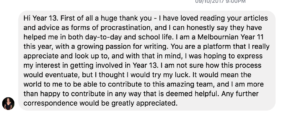Facebook has long evolved from just being a way to keep in contact with friends and family, however one aspect of the platform has largely retained its original purpose – until now. Messenger is increasingly being used by businesses to streamline customer engagement along each stage of the user journey; Facebook has revealed that over 10 billion messages are being exchanged between people and businesses each month.
The speed and convenience associated with this mode of communication is particularly alluring for consumers, and behind an effective messaging plan lies the potential to foster strong brand loyalty. This is exceptionally important for engaging with youth markets, with 65% of Millennials preferring to message rather than call or email.
This is evident in the communication Year13 receives through Messenger, with our young audience reaching out to us consistently and for various reasons. The team have been effective in leveraging this engagement to improve our business practices, all the way from building leads to refining our content strategy.
What consumers are looking for
Facebook outlines the six stages of the user journey as follows: Making a general enquiry, making a product or service enquiry, making a purchase, making a reservation, seeking support for a product or service, and sharing feedback on a product or service. According to their data, more than half of people surveyed who message businesses do so across all stages, highlighting the flexibility of this form of interaction. It is therefore important to be open to all types of messaging, and to pay attention to the type that your customers will naturally fall into.
Of the people surveyed that do message businesses, over 59% say they do so because it provides them faster responses. Over 50% say it provides better advice, and over 64% say it’s because they’re always messaging anyway. From this we can see that consumers are mainly after speed and convenience, to which messaging provides unmatched service.
The quality of these interactions is also likely to influence customers’ perception of the brand and encourage them to continue using these tools to communicate with businesses. In fact, over 66% of people surveyed say that messaging companies makes them feel more confident in the brand. Furthermore, over 70% say they will message businesses more in the future with customer service questions and over 59% will message more to make purchases.
Our approach
While the interaction with our audience on Year13 through Messenger didn’t start with a deliberate strategy, it has since been built on the kinds of messages we regularly receive and have come to expect. In line with what Facebook has said about the potential to engage with consumers at every stage of the user journey, our audience has communicated to us for a bunch of different reasons – even to ask if they could contribute to our site.
General Enquiry Service Enquiry Sharing Feedback ContributeTo us, communicating through Messenger is an extension of the service we provide to young people in helping them achieve their potential. It is both indicative of and contributes to the level of trust we have developed between our audience, and continuing to interact with them in this way is important to our brand success.
To ensure we’re meeting the consumer’s expectation for a timely response, our social media team are often checking notifications outside of office hours – this is when most young people are using their phones and messaging businesses. We also make sure the team are knowledgeable in the products and services on offer, and are comfortable employing our brand voice in their interactions. This ensures our communication is helpful and our audience receives messaging that is consistent across different mediums. Feedback we receive this way is also taken seriously when constructing our future content plans.
In his presentation at our YES18 event, Facebook Agency Partner Tom Hosking explained different ways educators and agencies could use their platform to build meaningful leads and connections. He has provided us with a link to their Best Social Media Practices guide which includes a chapter on how to use Messenger to grow business relationships, such as using ads, bots, and sponsored messages to foster community.









